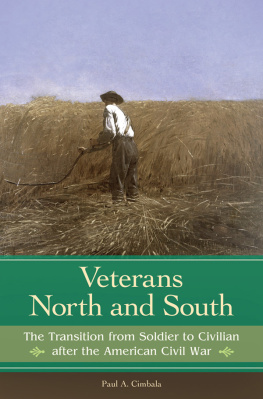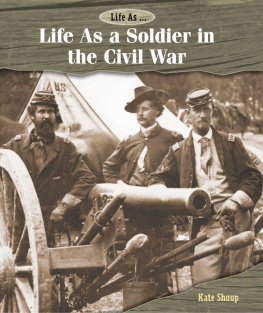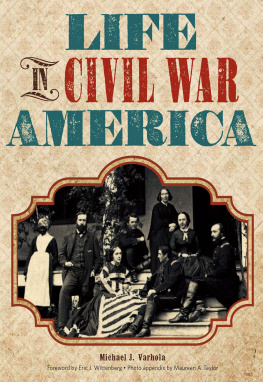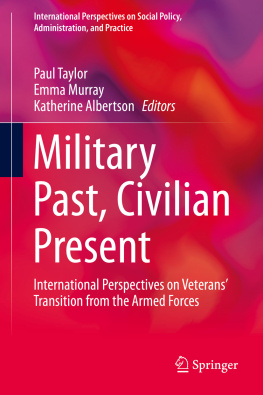VETERANS NORTH AND SOUTH
Recent Titles in Reflections on the Civil War Era
Decision in the Heartland: The Civil War in the West
Steven E. Woodworth
True Sons of the Republic: European Immigrants in the Union Army
Martin W. fele
Weary of War: Life on the Confederate Home Front
Joe A. Mobley
The Civil War at Sea
Craig L. Symonds
Politics and America in Crisis: The Coming of the Civil War
Michael S. Green
The Confederacy: The Slaveholders Failed Venture
Paul D. Escott
The Black Experience in the Civil War South
Stephen V. Ash
The Civil War in the East: Struggle, Stalemate, and Victory
Brooks D. Simpson
Civil War Journalism
Ford Risley
The Civil War in the Border South
Christopher Phillips
American Civil War Guerrillas: Changing the Rules of Warfare
Daniel E. Sutherland
The Civil War and the West: The Frontier Transformed
Carol L. Higham
Copyright 2015 by Paul A. Cimbala
All rights reserved. No part of this publication may be reproduced, stored in a retrieval system, or transmitted, in any form or by any means, electronic, mechanical, photocopying, recording, or otherwise, except for the inclusion of brief quotations in a review, without prior permission in writing from the publisher.
Library of Congress Cataloging-in-Publication Data
Cimbala, Paul A. (Paul Alan), 1951
Veterans north and south : the transition from soldier to civilian after the American Civil War / Paul A. Cimbala.
pages cm. (Reflections on the Civil War era)
Includes bibliographical references and index.
ISBN 978-0-275-98467-0 (alk. paper) ISBN 978-0-313-03821-1 (eISBN)
1.United StatesHistoryCivil War, 18611865Veterans. 2. United States HistoryCivil War, 18611865Social aspects. 3. VeteransUnited States History19th century. 4. VeteransConfederate States of America. 5. VeteransUnited StatesSocial conditions19th century. I. Title.
E462.C53 2015
973.7086'97dc23 2015013001
ISBN: 978-0-275-98467-0
EISBN: 978-0-313-03821-1
191817161512345
This book is also available on the World Wide Web as an eBook.
Visit www.abc-clio.com for details.
Praeger
An Imprint of ABC-CLIO, LLC
ABC-CLIO, LLC
130 Cremona Drive, P.O. Box 1911
Santa Barbara, California 93116-1911
This book is printed on acid-free paper 
Manufactured in the United States of America
For my mother, Betty Lee Terryberry, who encouraged me to study anything and everything, and in memory of my grandmother, Viola Lee Wildblood, who was my first history teacher
CONTENTS
A photo essay follows p. 82.
Like Ol Man River, the distinguished Civil War historian Peter J. Parish wrote in 1998, Civil War historiography just keeps rolling along. It changes course occasionally, leaving behind bayous of stagnant argument, while it carves out new lines of inquiry and debate.
Since Confederate General Robert E. Lees men stacked their guns at Appomattox Court House in April 1865, historians and partisans have been fighting a war of words over the causes, battles, results, and broad meaning of the internecine conflict that cost more than 620,000 American lives. Writers have contributed between 50,000 and 60,000 books and pamphlets on the topic. Viewed in terms of defining American freedom and nationalism, Western expansion and economic development, the Civil War quite literally launched modern America. The Civil War, Kentucky poet, novelist, and literary critic Robert Penn Warren explained, is for the American imagination, the great single event of our history. Without too much wrenching, it may, in fact, be said to be American history.
The books in Praegers Reflections on the Civil War Era series examine pivotal aspects of the American Civil War. Topics range from examinations of military campaigns and local conditions to analyses of institutional, intellectual, and social history. Questions of class, gender, and race run through each volume in the series. Authors, veteran experts in their respective fields, provide concise, informed, readable synthesesfresh looks at familiar topics with new source material and original arguments.
Like all great conflicts, Parish noted in 1999, the American Civil War reflected the society and the age in which it was fought. Books in Reflections on the Civil War Era interpret the war as a salient event in the hammering out and understanding of American identity before, during, and after the secession crisis of 18601861. Readers will find the volumes valuable guides as they chart the troubled waters of mid-nineteenth-century American life.
John David Smith
Charles H. Stone Distinguished Professor of American History
The University of North Carolina at Charlotte
In July 1865, Wilbur Fisk, a veteran of Americas Civil War, returned to his Turnbridge, Vermont, home after serving in the U.S. volunteer army since the summer of 1861. It struck the twenty-six-year-old former farm hand, mill worker, and teacher how this once familiar place had become something different during the time he and his comrades had been away.
If his Vermont home had changed, so, too, had Fisk. For one thing, the bachelor volunteer returned home a married veteran, the consequence of an unauthorized leave he took to woo and marry Angelina Drew, a neighboring farmers daughter who at the time was working in a Massachusetts mill. That marriage might have symbolized Fisks growth from a youth to a man, but it certainly spoke to Fisks optimistic view of the futures possibilities even as the war had raged on around him. What was clear about Fisks present was that he was no longer the green recruit who had joined the Second Vermont Volunteers at the outset of the war eager to avenge the disaster at the first Battle of Bull Run. A lifetime of experience has been crowded into this fierce war, he admitted, and no doubt he had witnessed things he never could have imagined before he had left his home.
After visiting a portion of the battlefield at Spotsylvania Court House in May 1864, for example, he confessed to the home folks through one of his many letters to Montpeliers The Green Mountain Freeman that he had never seen anything so horrible. Our men lay piled one [on] top of another, nearly all shot through the head, he wrote. Rebels, he continued, lay on the ground four or five deep. So shocking was the scene that the Vermonter turned away from that place, glad to escape from such a terrible, sickening site. Fisk and his comrades had encountered death before the war, but this was not the same kind of dying. I have sometimes hoped, that if I must die while I am a soldier, I should prefer to die on the battle-field, he wrote at the time, but after looking at such a scene, One cannot help turning away and saying, Any death but that.







![Louis Hicks - The Civilian Lives of U.S. Veterans: Issues and Identities [2 volumes]](/uploads/posts/book/133676/thumbs/louis-hicks-the-civilian-lives-of-u-s-veterans.jpg)


